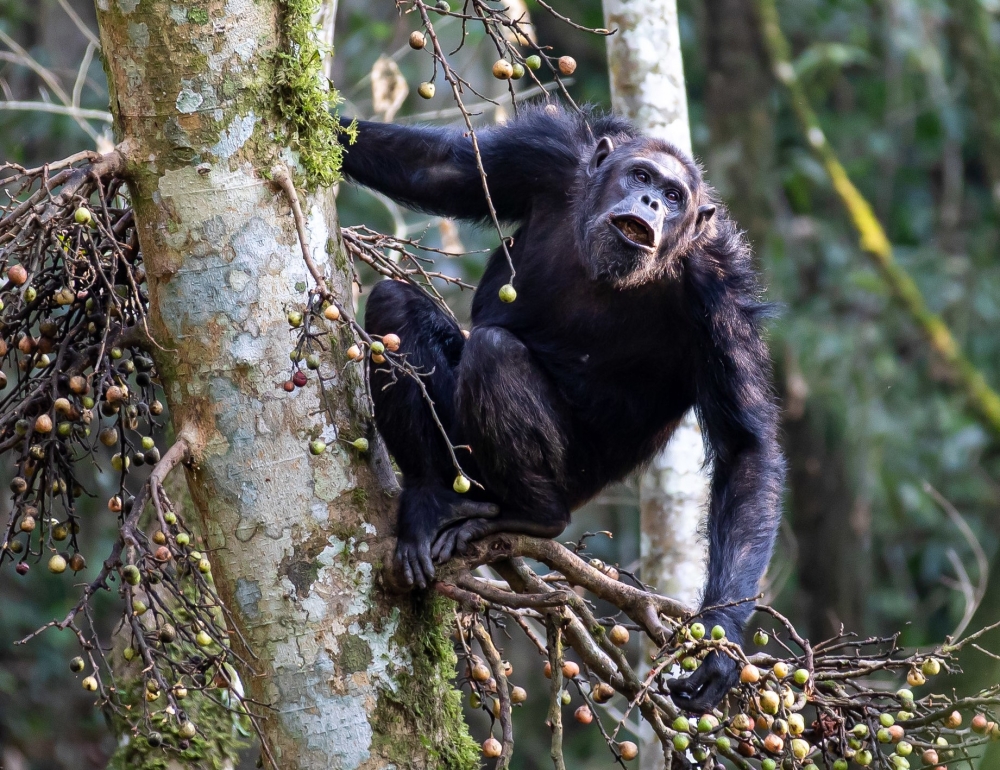

Rwanda is home to several communities of chimpanzees, which are found in the thick forests of Nyungwe National Park, Cyamudongo, and Gishwati. These intelligent primates, with a population of around 500 in Rwanda, offer a sight into the wild yet familiar world of humans&039; closest cousins.
Nyungwe National Park, home to about 450 of Rwanda’s chimpanzees, provides tourists with the rare opportunity to see these incredible animals up close.
This browser does not support the video element.
There are four habituated groups of chimpanzees – Cyamudongo, Mayebe, Kamiranzovu and Gisovu – open for visits year-round. This habitat is ideal for chimpanzees, who thrive in the park’s dense tropical forests, living in a community structure led by an alpha male and characterized by complex social interactions.
According to Protais Niyigaba, CEO and Nyungwe Park Manager, chimpanzees share 98 per cent of their DNA with humans, making them not only interesting creatures to observe but also highlighting the undeniable connection between humans and nature.
Next time you find yourself trekking through Nyungwe’s misty forests, take a moment to appreciate the humor and intelligence of these incredible creatures – they might just be closer to humans than we think!
ALSO READ: 10 reasons why Nyungwe National Park should be your next adventure
Fascinating facts about chimps
Physicality
As noted by Niyigaba, chimps are part of the primate species and share many physical traits with humans. Covered in black fur, except for their faces, hands, and feet, chimps grow grey hair as they age.
Their opposable thumbs allow them to grasp objects, and while they primarily walk on all fours (using their knuckles), they can occasionally stand and walk on two feet.
Habitat and diet
Living in the dense forests of Africa, chimpanzees’ diet consists mainly of fruits, leaves, flowers, insects, and even the occasional mammal. But what makes them truly stand out is their ability to use tools for feeding.
These primates have been observed cutting tree branches, sharpening them to extract honey from tree holes. Their intelligence and tool-making skills are unmatched among other wild primates.
Reproduction
Chimpanzees have a unique reproductive cycle as well. Female chimps care for their newborns for about five years before having another offspring, with weaning occurring around the four-year mark. Their gestation period lasts 8.5 months.
Sexual maturity in males is reached between 11 and 15 years, while females can become sexually mature by the age of 10.
During estrous (heat), females mate with multiple males, which some scientists believe is a strategy to confuse paternity and prevent infanticide—where males kill babies that aren’t theirs.
In this way, males are less likely to harm infants when they are unsure of their paternity. In fact, an estrous female can mate more than 50 times a day.
Interactions with humans
When it comes to interacting with humans, only habituated chimps are visited by tourists. These chimpanzees are comfortable with human presence as long as they are not disturbed or fed, which is strictly prohibited.
Tourists must maintain an 8-meter distance and wear face masks to prevent disease transmission, as the close DNA relationship between humans and chimps also increases the risk of shared diseases.
Weight
Adult chimpanzees typically weigh between 40kg and 65kg, with males generally being larger than females, a characteristic known as sexual dimorphism.
Longevity
Chimpanzees live between 30 and 40 years, with some reaching up to 50 years. In captivity, such as in zoos, their lifespan can extend to 60 years due to regular feeding and medical care.
ALSO READ: How Rwanda will benefit from Nyungwe forest’s UNESCO World Heritage status
Social behavior
Chimpanzees are social animals that live in groups led by a dominant alpha male, often supported by subordinates. These groups also include adult females, sub-adults, juveniles, and babies, creating a structured family dynamic. However, these groups can be violent toward neighbouring families.
Male chimps from the same family may attack neighbouring families, steal females and often kill their babies. This is done to ensure the captured females are ready to reproduce with the winning males.
Female chimps, on the other hand, leave their family groups to avoid inbreeding, seeking out unrelated males for reproduction.
Another somewhat quirky behaviour observed in chimpanzees occurs during times of food scarcity. In extreme cases, chimps will feed on their own faeces, a fact that Niyigaba jokingly suggests highlights the 2 per cent difference in DNA between humans and chimpanzees.
Beyond their curious behaviour, chimpanzees play a crucial role in the environment. By consuming large amounts of fruit and distributing seeds over long distances through their faces, chimpanzees help maintain the health and diversity of the forest. As forest gardeners, if one may call it that way, they ensure the natural regeneration of Rwanda’s forests.
Globally, the chimpanzee population is estimated to be between 172,000 and 300,000.


